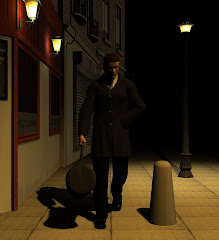Watched The Spy Who Came In From The Cold yesterday. Not for the first time and hopefully not for the last. John le Carré novels always worked well on film, where his fine plots and characters aren't held back by his rather mediocre prose. It also helped that they featured some especially brilliant actors. The Spy Who Came In From The Cold starred Richard Burton, a man whose whisky-soaked charisma practically staggers out of the screen.. Later Alec Guinness would make spymaster George Smiley his own and infuse the role with his wonderful brand of sinister melancholy.
However, I also couldn't help thinking that le Carré must be in despair nowadays. His books seemed to be a concentrated attack on the glamorising of spies during the Cold War. A tendency epitomised by James Bond, of course, smirking around in his tux like an aristocrat, shooting or shagging everyone in sight. Le Carré created shabby, melancholic little men; and they knew the truth about their fellow operatives. "Drunks… hen-pecked husbands… civil servants playing Cowboys and Indians to brighten up their drab lives," Burton's character spits. He also sums up the level of morality involved: "Yesterday I wanted to kill Mundt because he was evil and my enemy," he says of a Communist double agent. "Today he's evil, and my friend." Le Carré's approach became popular for a while. Even a writer as mediocre as Len Deighton could put some balance and intelligence into his Cold War yarns.
And now? Spies are superheroes again and every bit as banal. James Bond is seemingly indestructible, each new film as inevitable and over-publicised as Christmas. In Jack Ryan, Tom Clancy somehow created a character even worst; morally impeccable, utterly lifeless. On TV, meanwhile, Spooks and 24 seem locked in a bitter contest to see who can be the most absurd. Cops, doctors and even, for that matter, superheroes, can be deeply flawed and barely functioning sociopaths. Spies have to be two dimensional.
It's unfortunate because a more balanced portrayal is needed right now. One of The Spy Who Came In From The Cold's central themes was that your methods cannot afford to be less wicked than your enemy's. Morality only plays a part in your ultimate goals. And this had grim consequences when the West was just fighting totalitarian regimes who shot individuals they suspected were guilty. How about now, when the enemy blows up groups without caring who is innocent? Have our tactics become more brutal to match? It would seem so, from the accounts which have seeped out from Guantanamo Bay and Iraq. But you'll be lucky to see any acknowledgement on screen.
Sunday, December 16, 2007
Not Shaken Or Stirred
Subscribe to:
Post Comments (Atom)

No comments:
Post a Comment